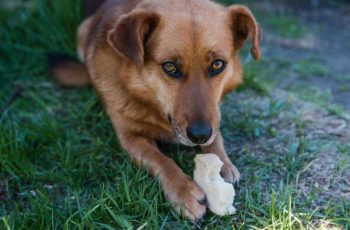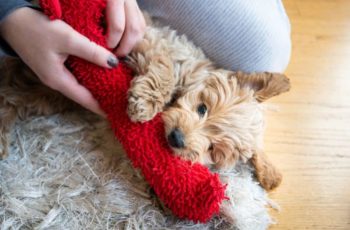This post may contain affiliate links. We may earn money or products from the companies mentioned in this post.
If your older dog starts having accidents in the house, this is likely related to aging.
As much as it’s frustrating having to clean up your dog’s fecal incontinence and leaky bladder, try to be patient and understanding with your furry love.
They’re not peeing and pooping around the house on purpose and are probably even feeling really bad about it.
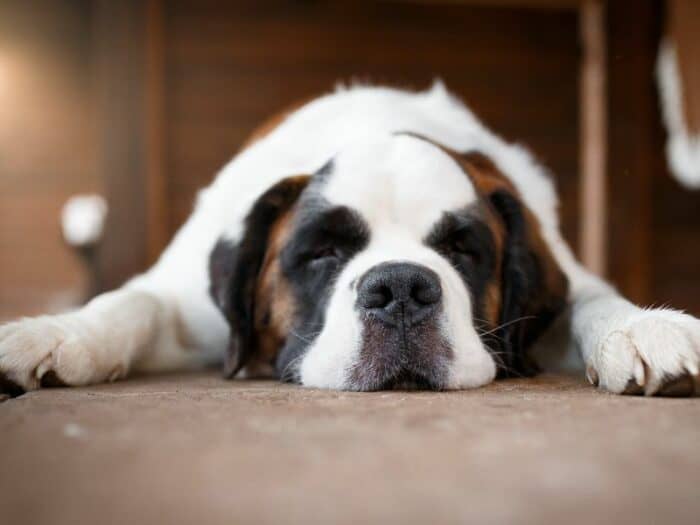
Especially if they were housetrained and used to have a regular potty schedule!
That said, there are several different possibilities as to why your older pup suddenly seems to have forgotten all about their manners, and we’ll look at them in this blog post.
That brings us to todays question: What should I do when my older dog is having accidents in the house?
Why Is My Elderly Dog Suddenly Having Accidents?
But the first step of action should always be to schedule a vet appointment once you notice that your older dog starts having accidents in the house.
That’s to rule out both acute and chronic medical conditions such as:
- UTI (Urinary Tract Infection)
- Bladder stones/crystals
- Bladder cancer
- Spinal condition
- Kidney disease
- Diabetes
- Arthritis
If you’ve ever had a UTI yourself, you know how painful they can be.
That’s why one UTI symptom in dogs is whining when they’re peeing or trying to pee. Others are the need to lift their leg or squat very frequently, blood in the urine and licking of genitals.
Dogs who keep having UTIs that don’t respond to medical treatment can be a sign of bladder cancer.
Bladder stones also cause pain and can be accompanied by cloudy urine, blood in the urine and a bloated stomach. Your pup also won’t feel up to exercising and will seem lethargic overall.
Diabetes causes increased thirst which leads to more frequent urination and can easily trigger accidents inside.
Certain medications can also cause an increase in your dog’s potty needs.
Arthritis related pain and certain spinal conditions can make it challenging for your pup to get up when they have to potty, so they may have no other choice than to pee (or poop) while they’re lying down.
Senior Dog Incontinence & Canine Cognitive Dysfunction
Beyond acute medical reasons, your dog may be dealing with age-related issues such as dog incontinence and Canine Cognitive Dysfunction (CCD).
Depending on their size, dogs are considered senior anywhere between 7-12 years of age. The larger the dog, the shorter their life span and the earlier they’re considered seniors.
So a 7 year old Great Dane is considered a senior dog while a 7 year old Beagle is still middle-aged!
But either way, bladder and bowel dog incontinence are part of a dog getting older. It’s when bladder and anal sphincter muscles gradually become weaker and the dog loses control over their potty behavior.
This can happen both when they’re awake and when they’re asleep. Dog incontinence medication can help tighten the sphincter muscles and nerves, and there are also several tools that can help manage the condition.
We’ll mention those in one of the next sections!
Canine Cognitive Decline or Dysfunction (CCD) translates to memory decline, which is a form of doggie Alzheimer’s. It starts when dogs are around 9 years old and progresses from mild to moderate and severe.
It’s essentially dementia in dogs where they forget routines and learned behaviors which causes them to start having accidents in the house. For example, house rules or using the doggie door to the yard.
Other signs of dementia in dogs are restlessness, anxiety, confusion, staring and changed sleeping patterns. For example, wandering the house at night and having potty accidents.
Is Bladder & Bowel Incontinence A Reason To Put A Dog Down?
Well, that’s a tough question.
If your dog’s incontinence is caused by a medical condition that’s treatable with medications or homeopathic remedies, there’s no reason for an early goodbye from your four-legged friend.
But when your older dog starts having accidents in the house and their incontinence is caused by rapidly progressing dog dementia or an incurable disease, ending your dog’s pain may be the more humane thing to do.
It truly depends on the specific situation.
When my late pup Missy was diagnosed with cancer a second time around, it had already metastasized, spread into her brain and caused a rapid decline in her quality of life.
She started having violent grand mal seizures and was constantly peeing and pooping herself, so I ended up making the hard decision of relieving her from her pain in 2018. At that time, she was just shy of 7 years old.
There’s not one day that I don’t miss her, but I’m confident that I made the right choice when I let her go.
She wasn’t herself anymore and whenever she looked at me, it felt like she was begging me to give her peace.
So again, it’s going to depend on your dog’s particular condition.
How Do I Stop My Older Dog From Having Accidents In The House?
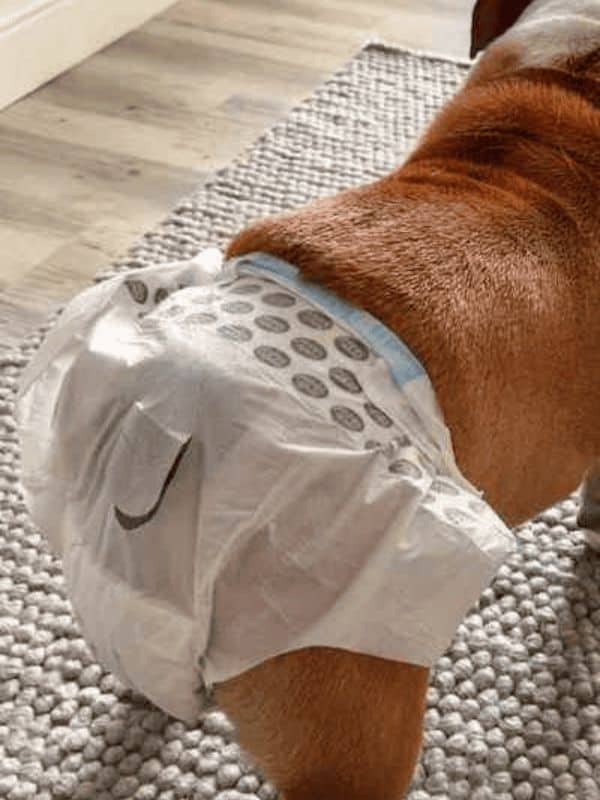
Along with a potential treatment plan from your vet, there are a few tools that can help you manage your dog’s accidents.
But unless your vet gives you medications that strengthen your dog’s sphincter muscles and nerves, you won’t really be able to stop your older dog from having accidents around the house.
Just as a heads up.
So How Do You Live With An Incontinent Dog?
When your older dog starts having accidents in the house, you take a deep breath, think positive thoughts and practice patience along with providing very frequent potty breaks!
If you can’t be home as much as you’d like/need to, consider hiring a professional dog walker or pet sitter.
They’ll be able to take your pup out to potty several times per day, change their diapers and provide much needed TLC.
Beyond that, there are several tools that help you care for an older dog with incontinence.
They range from a variety of different size diapers, both washable and disposable for female dogs & belly bands for male dogs, to washable dog pee pads, pet wipes and waterproof covers for your home and car.
For example:
How Do I Keep An Incontinent Dog Clean?
Don’t forget to take your dog’s diaper off before you take them outside!
When my pup Missy was in heat before she got spayed, I had her wear a washable dog diaper. It’s the same kind as the ones for dog incontinence in senior dogs.
Anyway, I forgot to take it off several times towards the beginning of her wearing them when we went outside for a potty break.
Thankfully, it was a quick fix because all I had to do was throw it into the wash, clean her with a pet wipe and put on a fresh diaper.
Years later, when Missy had accidents inside the house that were caused by her spreading cancer, I opted for disposable dog diapers and gave her quick in-between baths with a cleansing dog shampoo.
When she was home alone (which didn’t happen often during that time), I gated off an area for her in the kitchen that wasn’t carpeted.
There also wasn’t anything she could have hurt herself on in case she’d have a seizure.
I took close to no pictures during this time because I just couldn’t bear it, so you’ll have to excuse the lack of photo footage from that time.
One of my pet sitting clients, male Bichon mix Rocky, also started wearing disposable dog diapers as dog dementia set in when he was 11 years old. Rocky got frequent baths with a cleansing dog shampoo as well.
When Rocky was 14, his owner made the decision to let him go.
By that point, his health had deteriorated to the point where he had no sense of orientation, constantly walked into walls and into and over food and water dishes.
It’s always so hard to make that decision, and the best advice I can share is you’ll just know when the time has come. Your pup will let you know.
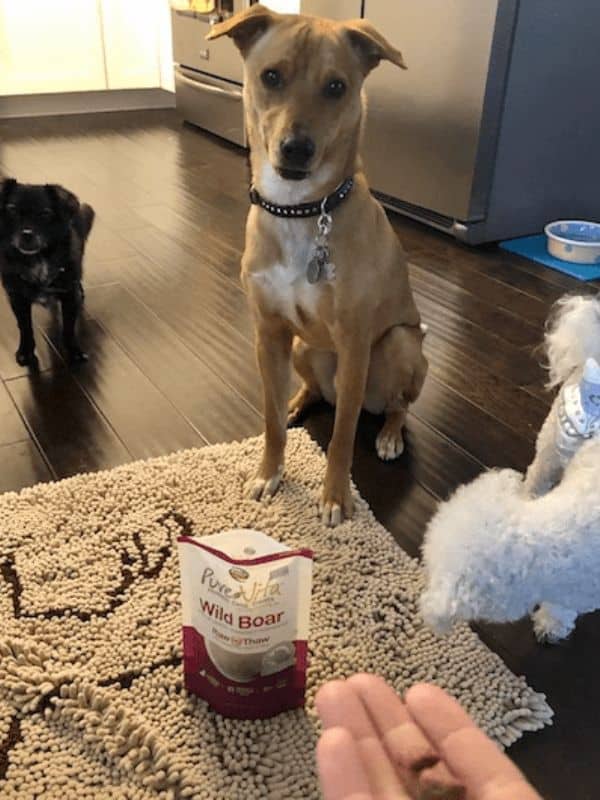
Can Dogs Wear Diapers Overnight?
Yes, they certainly can.
That way, your dog can still cuddle on the couch with you and/or sleep in your bed if that’s what they’re used to, and that’s exactly what Missy and Rocky did too.
As you’ll want to keep your dog as dry as possible to avoid (urinary tract) infections, it’s important to monitor their diaper or belly band.
It’s best to put on a fresh one right before bedtime and to check it again first thing in the morning to see if it needs to be switched out for a clean one – which it probably will.
Also, if you notice your pup moving around in the middle of the night, they may have peed or pooped themselves so you’ll want to check if they need a fresh diaper.
Before you replace diapers, wipe your pup down with a pet wipe.
With Missy, I also lined my bed with a waterproof cover because diapers couldn’t hold the amount of urine and feces when she had a grand mal seizure in the middle of the night.
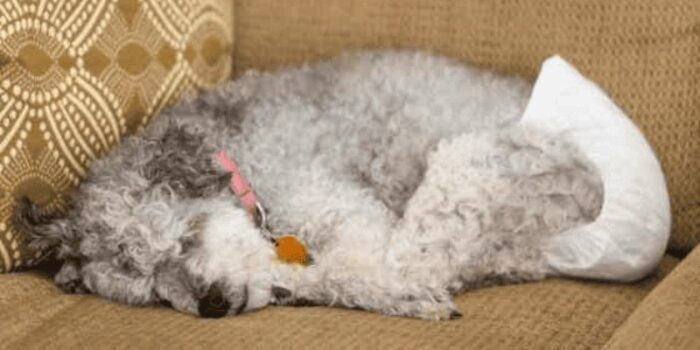
Bottom Line
When your older dog starts having accidents in the house, try to stay as calm and collected as possible.
Before jumping to any premature conclusions and decisions, call your vet to schedule a check-up and take things from there.
If your vet diagnoses your pup with an acute medical condition such as a UTI or a chronic illness like diabetes, they’ll be able to prescribe medications that will reduce your dog’s need to urinate.
But if the vet suspects that your older dog suffers from Canine Cognitive Dysfunction, leaky bladder and fecal incontinence are going to be a part of your new doggie routine.
Remember that you’ll have to provide considerably more potty breaks than before and that you may need to hire a professional dog walker or pet sitter to help you out in that regard.
Besides the increase in potty breaks, your best coping strategy is going to be a combination of doggie diapers, wet wipes, washable furniture covers and dog pee pads.
That said, there will be days where you’ll wonder how much longer you can continue sharing a house with an incontinent dog.
Use your best judgment and let your pup tell you when their quality of life isn’t what it used to be, and when it’s time to say goodbye.
Until then, enjoy the golden years with your furry friend and make sure that your senior dog is comfortable as much as possible.
Save To Pinterest
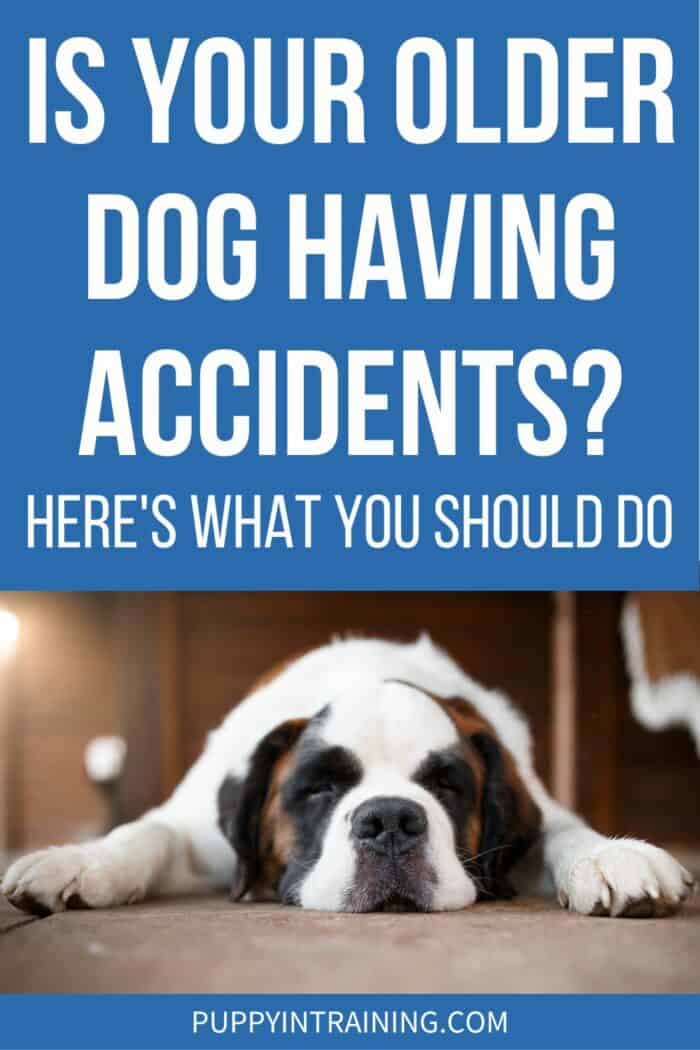
Top Picks For Our Puppies
- BEST PUPPY TOY
We Like: Calmeroos Puppy Toy w/ Heartbeat and Heat Packs – Perfect for new puppies. Helps ease anxiety in their new home. - BEST DOG CHEW
We Like: Mighty Paw Naturals Bully Sticks – All of our puppies love to bite, nip, and chew. We love using Bully Sticks to help divert these unwanted behaviors. - BEST DOG TREATS
We Like: Crazy Dog Train-Me Treats – We use these as our high-value treats for our guide dog puppies. - BEST FRESH DOG FOOD
We Like: The Farmer’s Dog – A couple months ago we started feeding Raven fresh dog food and she loves it! Get 50% off your first order of The Farmer’s Dog.
Check out more of our favorites on our New Puppy Checklist.

